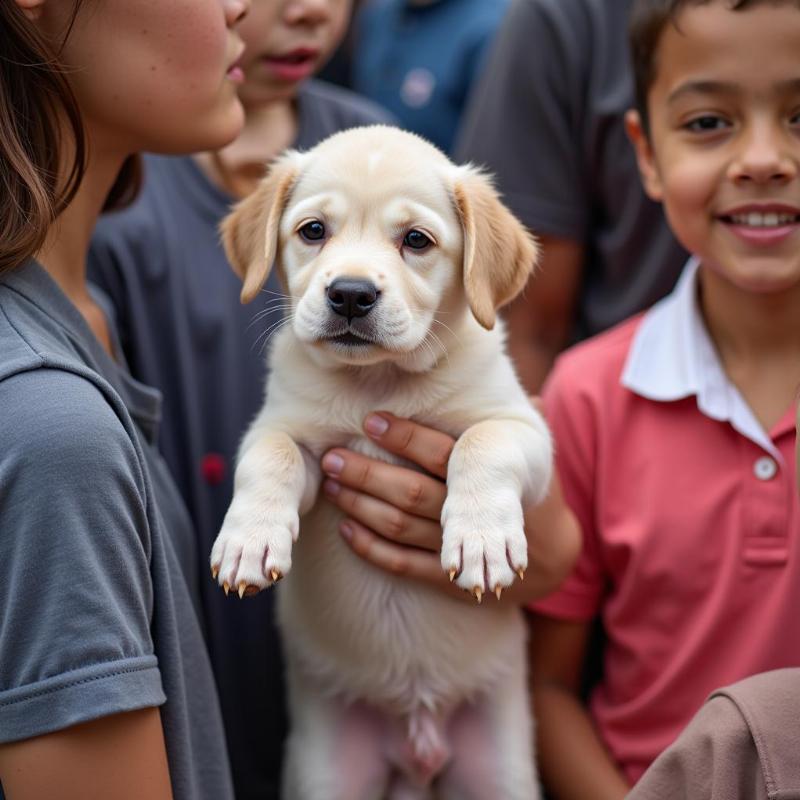Dealing with a dog that becomes aggressive when guests arrive can be stressful and embarrassing. This aggression can range from barking and lunging to growling and even biting. Understanding why your dog is reacting this way is the first step to addressing the problem and creating a safe and welcoming environment for everyone. Let’s explore the causes of this behavior, effective training techniques, and strategies to manage your dog’s aggression towards house visitors.
Why is My Dog Aggressive to Visitors?
Several factors can contribute to a dog’s aggression towards visitors. Fear is a common cause, especially in dogs that haven’t been properly socialized. They may perceive visitors as threats, triggering a defensive response. Territoriality also plays a role; some dogs are fiercely protective of their home and family. Past negative experiences, such as being startled or injured by a stranger, can also lead to aggressive behavior. Finally, some medical conditions can cause increased irritability and aggression.
Managing Dog Aggression Towards Visitors
The first step in managing your dog’s aggression is to consult with a qualified veterinarian or a certified dog behaviorist. They can help determine the underlying cause of the aggression and recommend a tailored training plan. In the meantime, several strategies can help manage the situation.
Creating a Safe Space
Providing your dog with a safe space, like a crate or a designated room, can help them feel secure when visitors arrive. This space should be equipped with their favorite toys and bedding and should be associated with positive experiences. When guests arrive, lead your dog to their safe space and reward them with a treat.
Desensitization and Counter-Conditioning
Desensitization and counter-conditioning are effective techniques for addressing fear-based aggression. This involves gradually exposing your dog to visitors at a safe distance, pairing their presence with positive reinforcement like treats or praise. Over time, as your dog becomes more comfortable, the distance can be gradually decreased.
Obedience Training
Basic obedience training, including commands like “sit,” “stay,” and “leave it,” can help you control your dog’s behavior when visitors are present. A well-trained dog is more likely to listen to your commands and remain calm in potentially stressful situations.
Medication
In some cases, medication may be necessary to manage a dog’s aggression, particularly if it’s related to an underlying medical condition. Your veterinarian can determine if medication is appropriate and recommend the best course of treatment.
Preventing Dog Aggression Towards Visitors
Prevention is key to avoiding aggression issues in the first place. Early socialization is crucial. Expose your puppy to a variety of people, places, and sounds from a young age. This will help them develop into well-adjusted adults. Consistent training and positive reinforcement will also contribute to a well-behaved dog.
 Puppy undergoing socialization training
Puppy undergoing socialization training
Conclusion
Addressing dog aggression towards house visitors requires patience, consistency, and a commitment to training. By understanding the root causes of the behavior and implementing effective management strategies, you can create a safe and welcoming environment for both your dog and your guests. Don’t hesitate to seek professional help from a veterinarian or certified dog behaviorist for personalized guidance. Remember, creating a harmonious environment benefits everyone.
FAQ
-
What should I do if my dog bites a visitor? Seek immediate veterinary care for the injured person and consult with your veterinarian and a dog behaviorist to address the underlying aggression.
-
Can I train an older dog to be less aggressive towards visitors? Yes, older dogs can still learn. Consult with a professional for age-appropriate training techniques.
-
How long does it take to see results with desensitization and counter-conditioning? The timeframe varies depending on the dog and the severity of the aggression. It’s a gradual process that requires patience and consistency.
-
Are certain dog breeds more prone to aggression towards visitors? While any dog can exhibit aggression, some breeds may have a higher predisposition due to their protective instincts.
-
What are some signs that my dog is feeling anxious or fearful around visitors? Signs include tucked tail, flattened ears, panting, lip licking, yawning, whale eye, and avoidance.
Related Articles on Beautdogs.us
how to stop dog from barking at strangers
Beautdogs.us is your premier destination for all things dog-related in the United States. We provide expert advice on dog breeds, care, training, and the latest pet products. Whether you’re a new dog owner or a seasoned pet parent, Beautdogs.us is your trusted resource for comprehensive and engaging information on canine companionship. Contact us for personalized support at [email protected] or +1 501-555-7529. Visit Beautdogs.us today for a wealth of information to enhance your dog’s life.